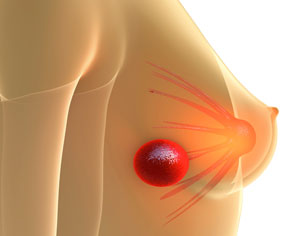Progesterone Therapy and Breast Cancer – What You Need to Know
Approximately half of all breast cancer diagnoses are ER (estrogen receptor) and PR (progesterone receptor) positive. Patients will ER-positive, and PR-positive breast cancer have long been observed to have better clinical treatment outcomes. At the Cancer Research UK Cambridge Institute, along with colleagues from the University of Adelaide in Australia, researchers noted that estrogen and progesterone receptors had a physical interaction within the cell and that their global gene expression profile of the cells differed when exposed to just estrogen as opposed to a combination of estrogen and progesterone. This is just the start of examining the connection between progesterone therapy and breast cancer.
Furthermore, using progesterone therapy for breast cancer along with tamoxifen slowed the growth of tumors as compared with using either of the hormones alone as shown in both lab-grown cells and in breast cancer tumors transplanted into mice. The doctors used ER-positive breast tumor cells taken from patients and grew them in a lab for this study that has not yet proceeded to clinical trials.
Further progesterone breast cancer review by the American Cancer Society shows that about two-thirds of breast cancers fall into the hormone receptor-positive scenario. These cancers are fueled by high levels of estrogen. This can occur when a woman is experiencing a decline in progesterone levels. Lowering estrogen levels or stopping estrogen from acting on breast cancer cells is the goal of the prescribed treatment.
The Role of Progesterone in the Treatment of Breast Cancer
The progesterone breast cancer link is becoming clearer with advancing research. The ER and PR receptors initiate their function by switching genes on and off. Both progesterone and estrogen stick to their individual receptors, stimulating them to move into a cell’s nucleus where DNA is found. Attachment to specific regions of DNA can then turn the genes on or off, initiating a change in cellular behavior.
As breast cancer cells develop and grow, they become increasingly sensitive to the effects of oestrogen. This causes a panel of genes to stimulate the dividing processes of the breast cancer cells, furthering growth of the tumor. As part of the use of progesterone treatment and breast cancer, increasing the level of progesterone in the body helps to reduce the effects of estrogen.
How does this work? During the research, the doctors used double-positive breast cancer cells that were grown in the lab and had sufficient oestrogen and progesterone in them to activate both types of receptors. They then cracked open the cells and used a sophisticated method to remove the progesterone receptor for examination. In their study about progesterone and breast cancer, they found that the actual progesterone receptor was physically stuck to the oestrogen receptor, affecting the way that the oestrogen receptor worked.
Taking this research a step further, the same lab-grown breast cancer cells were exposed only to oestrogen so that the researchers could pinpoint the DNA sites in the cells where activated oestrogen receptors attached in order to determine which of the genes it was controlling. The further connection between progesterone therapy and breast cancer was shown when progesterone was then added to the cancer cells, causing a rapid shift in points where the oestrogen receptor attached to the DNA.
What this may mean is that progesterone hormone therapy for breast cancer can put a brake on oestrogen fueled cancer cell growth and division. During this research, at least 470 different genes were controlled in an altered way when progesterone was added to the oestrogen. In addition, the progesterone caused the cellular growth to slow down.
Side Effects of Progesterone for Breast Cancer
In general use for menopause and post-menopause, there have been no incidents of serious side effects attributed to progesterone therapy. Examining any progesterone and breast cancer risk is too soon at this time since trials have even yet to be done. The good news is that the majority of women can be given progesterone safely, as opposed to synthetic progestin which does carry risk factors and was not used in the above-mentioned study and research.
It is also hopeful that the role of progesterone in breast cancer recurrence will help to minimize future risks. Again, this is still something that is a long way off, but the outcome is promising based on current research.
Progesterone and Hormone Options for Breast Cancer Treatment
We know that hormone imbalance can increase the risk of developing breast cancer, as well as many other medical issues. Many factors can lead to hormone imbalance, including stress, lack of exercise, menopause, oophorectomy, xenoestrogens (toxins in the environment), poor diet, reduced sleep, and even a negative outlook on life. While the use of progesterone and breast cancer prevention is still being examined, we do know that ensuring that progesterone levels remain higher than estrogen is crucial for protecting breast health, as well as many other important functions in the body that cannot be overlooked.
The use of progesterone for breast cancer prognosis may still be a long way off dependent of when clinical trials are set to begin, but this is still a conversation that can be initiated with one’s doctor. Cancer is an individual diagnosis, and each person’s treatment must reflect the individuality of her condition.
Here at National HRT, we strive to bring forth the most current information to women and men dealing with any type of hormonal imbalance. We are happy to provide complimentary consultations regarding the use of bioidentical hormone therapies for a variety of health situations.
- Progesterone and bast cancer Carol A Lange, Associate Professor, and Douglas Yee, Professor of Medicine Women’s Health (Lond Engl). Author manuscript; available in PMC 2014 May 30.Women’s Health (Lond Engl). 2008 Mar; 4(2): 151–162.
- Progesterone Exposure and Breast Cancer RiskUnderstanding the Biological Roots Purna A. Joshi, MSc, Ph.D.; Pamela J. Goodwin, MD, MSc, FRCPC Rama Khokha, Ph.D. JAMA Oncol. 2015;1(3):283-285. June 2015
- cancer network
- breastcancer.org
- Effect of Progesterone on the Invasive Properties and Tumor Growth of Progesterone Receptor-transfected Breast Cancer Cells MDA-MB-231 Valerie C. L. Lin, Aw Swee Eng, Ng Eng Hen, Esther H. L. Ng, and Sanaul H. Chowdhury Published September 2001
- worldwide cancer research
- Regan MM, Neven P, Giobbie-Hurder A, et al. Assessment of letrozole and tamoxifen alone and in sequence for postmenopausal women with steroid hormone receptor-positive breast cancer: the BIG 1–98 randomized clinical trial at 8.1 years median follow-up. Lancet Oncology 2011; 12(12):1101–1108.
- Burstein HJ, Griggs JJ. Adjuvant hormonal therapy for early-stage breast cancer. Surgical Oncology Clinics of North America 2010; 19(3):639–647.
- Early Breast Cancer Trialists’ Collaborative Group (EBCTCG), Dowsett M, Forbes JF, et al. Aromatase inhibitors versus tamoxifen in early breast cancer: patient-level meta-analysis of the randomized trials. Lancet 2015; 386(10001):1341-1352.
- Chia YH, Ellis MJ, Ma CX. Neoadjuvant endocrine therapy in primary breast cancer: indications and use as a research tool. British Journal of Cancer 2010; 103(6):759–764
- Osborne CK, Pippen J, Jones SE, et al. Double-blind, randomized trial comparing the efficacy and tolerability of fulvestrant versus anastrozole in postmenopausal women with advanced breast cancer progressing on prior endocrine therapy: results of a North American trial. Journal of Clinical Oncology 2002; 20(16):3386–3395. [PubMed Abstract]





